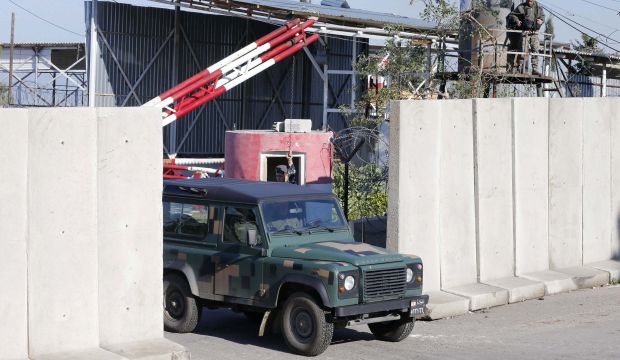
A military vehicle drives out of Lebanon’s Roumieh prison, on January 12, 2015. (REUTERS/Mohamed Azakir)
Nihad Mashnouq said on Sunday that Lebanese authorities had obtained evidence that the operation was conducted by ISIS, despite rival extremist group the Al-Nusra Front taking credit for the attack, which killed nine people and injured dozens more at a café in the city of Tripoli.
Mashnouq said Lebanese authorities had intercepted various communications which showed the group had a presence within Lebanon, inside what he called a “square of death” bounded by the border town of Arsal in the north, the Ain Al-Hilweh Palestinian refugee camp in the south, the Rumia prison east of Beirut, and reaching into Iraq and the ISIS stronghold of Raqqa in Syria.
“We are totally convinced that ISIS has a plan to enter Lebanon. We will resist them, first, through national unity and, second, through security resistance via the cooperation of the country’s security service and military,” Mashnouq said.
The minister visited the Jabal Mohsen area in Tripoli where the bombing took place—a largely Alawite neighborhood of the Sunni-dominated city—and said the government was coordinating with the Shi’ite group Hezbollah in order to ease sectarian tensions that might arise following the attack.
Lebanon’s fight against extremist groups had now become a “preemptive information and technology war,” Mashnouq said, adding that the next stage of this fight would be “a very difficult one” for the country.
He said Lebanese authorities were aware that one of the perpetrators of the attack, who was previously being monitored, had disappeared off the radar. It was believed the attackers were part of a brigade within ISIS, which has already carried out a number of attacks inside Lebanon including one where its leader, Munthir Al-Hassan, died during clashes with the Lebanese army, and another, a suicide bombing at a Beirut hotel last summer carried out by a Saudi national.
Following investigations into the scene of the attack, Lebanese security services said it had been carried out by two men, Taha Samir Khalil and Bilal Mohamed Al-Mar’ian. Police said their suicide bomb belts had been armed with 4 kilograms of TNT explosives.
Khalil’s uncle made a public statement following the attack on behalf of the Al-Mankoubeen area in Tripoli from where the perpetrator hails. He condemned the attack, and said residents in the area had “no hatred toward any section of the Lebanese population.”
A largely Alawite area in a Sunni-dominated city, Jabal Mohsen has been the site of sectarian violence in recent years due to the conflict in neighboring Syria, whose President Bashar Al-Assad and his family are also a member of the minority Shi’ite sect.
Police also arrested four other individuals in connection with the attack, all of whom were from an area near the Jabal Mohsen district. All four had been on wanted lists for charges relating to joining extremist groups.
On Monday, the Lebanese security forces raided the country’s largest detention facility, Roumieh prison, located east of Beirut.
Lebanese TV channel broadcast footage of security personnel searching prison cells, while helicopters hovered over the building.
Mashnouq told reporters that the authorities had monitored communications between some Roumieh prisoners and those who carried out Saturday’s attack.
“I can confirm that Roumieh prison is an operations room for [ISIS],” he said.
The prisoners would be moved to a separate wing of the prison, the minister added, as they had been in contact with militants who were still at large using contraband mobile phones and Skype.
A statement from the Lebanese Internal Security Forces said that prisoners had started a number of fires in protest, but no injuries had been reported.
A Twitter feed linked to the Al-Nusra group threatened reprisals for Monday’s raid.
“As a result of the deterioration of security in Lebanon, you will hear about surprises regarding the fate of the prisoners with us,” it raid, a reference to over 20 Lebanese army and police personnel held by the group following a battle in the border town of Arsal in August.
